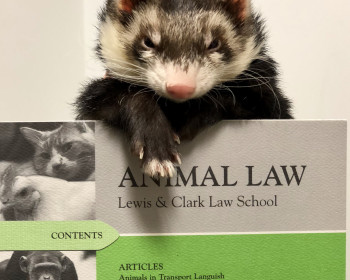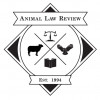Animal Law 23.2 Release!

Volume 23.2 contains the following titles:
INTRODUCTION:
Kathy Hessler, Animal Law in a Changing (and Challenging) Political Climate: One Professor’s Musings After 100 Days of the Trump Administration
This Introduction discusses the current political climate following the presidential inauguration of Donald J. Trump, with a focus on Trump’s first 100 days in office and what his actions entail for animal advocates as well as for the field of animal law. The Introduction approaches the Trump presidency through a historical and practical lens, then scrutinizes the Trump administration’s actions through its first 100 days. Following this analysis, the Introduction turns to the considerable number of voices that have risen in response to the President’s initiatives and to those of his party. This Introduction concludes by emphasizing the need for diligence and by proposing avenues for animal advocates to continue fostering change.
ARTICLES:
Angela Lee, Telling Tails: The Promises and Pitfalls of Language and Narratives in Animal Advocacy Efforts
Using a feminist theoretical perspective and drawing on examples from Canada and the United States, this Article considers the promises and pitfalls of language and narrative in the context of animal advocacy efforts. Because the animal advocacy movement faces an uphill battle on a number of fronts, leveraging language and narrative more conscientiously can help enhance its success. Elucidating the equivocal nature of the premises on which our current social and legal conceptualization of nonhuman animals lies can prompt a shift in the dominant modes of thinking about nonhuman animals, thereby stimulating meaningful change in their treatment. However, it is not only the message that matters, but also how that message is conveyed. Narratives offer a potentially more compassionate, less antagonistic way of drawing attention to nonhuman animal suffering in order to trigger an interruption in established ways of thinking that posit that nonhuman animals are outside of the realm of moral considerability and, therefore, outside the bounds of legal protection.
Dr. Edward A. Fitzgerald, Red Wolf Coalition v. North Carolina Wildlife Resources Commission: Better Red Than Dead
This Article demonstrates how federal district court decisions have protected the threatened red wolf. The history of red wolf introduction and the Fourth Circuit decision in Gibbs v. Babbitt are reviewed. In 2012, North Carolina allowed coyote hunting in the red wolf recovery area. The District Court for the Eastern District of North Carolina correctly issued an injunction stopping the action. The court held North Carolina set in motion events that led to the killing of red wolves and violated federal regulations regarding the taking of red wolves. The resulting settlement agreement precluded state interference with red wolf recovery. Genetic studies have questioned the red wolf’s taxonomic status. This Article posits that the red wolf should retain Endangered Species Act protections even if it is a gray wolf-coyote hybrid. The U.S. Fish and Wildlife Service attempted to curtail red wolf recovery in 2016. The federal district court properly halted the proposal.
Tiffany Lee, Criminalizing Fake Service Dogs: Helping or Hurting Legitimate Handlers?
An increasing number of states are passing laws criminalizing the use of fraudulent service animals. This Article explores the potential impact of these laws on people with disabilities and the effectiveness of these laws for places of business who want to exclude fraudulent service animals. The Article considers the nature of fraudulent service animal use and the reasons people may use them, the difficulties in enforcing these state laws in light of the Americans with Disabilities Act, and the potential detrimental effects on the civil rights of people with disabilities using legitimate service animals. Based on this analysis, the Article proposes alternative approaches to address the problem of fraudulent service animal use, recommending an increase in legislative clarity and improved public education.
David B. Rosengard, “Three Hots and a Cot and a Lot of Talk”: Discussing Federal Rights-Based Avenues for Prisoner Access to Vegan Meals
Vegan prisoners face obstacles in accessing meals congruent with their beliefs, but it may be possible to assert the right to vegan meals while incarcerated via a number of constitutional and statutory provisions. Focusing specifically on the federal legal landscape, this Article acts as a road map to those options. First, this Article discusses the scope of relevant religious free exercise jurisprudence—and its utility for prisoners who are vegan for religious reasons. Second, this Article explores the extent to which an equal protection approach may provide vegan prisoners with a viable route to securing appropriate meals. Third, this Article discusses possible application of the Eighth Amendment’s “cruel and unusual punishment” provision to vegan prisoners who are denied the appropriate diet. Fourth, it gives an overview of the Prison Litigation Reform Act’s impact on litigating these issues. The objectives are threefold: to summarize the relevant jurisprudence, to highlight new legal developments, and to suggest creative legal theories addressing the needs of vegan prisoners. In doing so, the Article seeks to support lawyers confronting these issues and benefit vegan prisoners.
Shih-Yun Wu, Animal Welfare Legislation in Taiwan and China: Examining the Problems and Key Issues
This Article offers an overview and evaluation of Taiwan’s and China’s draft laws for protecting animals, which were drafted by countries that have not experienced comprehensive animal welfare movements. The Article focuses on interpreting the statutory offenses for cruelty and animal welfare infringements, and the problems and deficiencies of the draft laws’ substance and enforcement mechanisms—the most critical factors affecting the effectiveness of the animal protection legislation.
COMMENT
Lora Dunn & David B. Rosengard, A Dog Is Not a Stereo: The Role of Animal Sentience in Determining the Scope of Owner Privacy Interests Under Oregon Law
In 2011, a relatively routine animal neglect investigation spawned a line of litigation that would eventually reach the Oregon Supreme Court. Along the way, this case—State v. Newcomb—raised issues central to both constitutional and animal law, involving inquiry into how animals are situated under the law, the weight of a defendant’s privacy versus an animal’s interests, and what relevance attaches to animals existing as feeling, sentient creatures. In analyzing Newcomb, this Comment discusses the case facts in Part I, before laying out the arguments heard—and decisions rendered— by the trial and appellate courts in Part II. Part III reads the Oregon Supreme Court’s Newcomb opinion in the context of two earlier Oregon animal criminal cases: State v. Fessenden and State v. Nix. This Comment argues the three, Fessenden, Nix, and Newcomb, form a trilogy of cases, which in turn reveal a jurisprudence that approaches the legal status of animals critically, rejecting absolutist constructs that insist animals must either be situated analogous to any other property or analogous to humans. Finally, this Comment examines the practical, jurisprudential, and strategic implications of the Oregon Supreme Court’s holding in Newcomb, before outlining as-of-yet unanswered questions the case points toward.
ESSAY
Anita Krajnc, Bearing Witness: Is Giving Thirsty Pigs Water Criminal Mischief or a Duty?
Toronto Pig Save and the Save Movement gained worldwide attention with the Pig Trial. The defense, with the help of a coalition of animal rights groups, was able to put animal agriculture on trial by focusing on the ethics, animal suffering, environment, and health aspects of animal agriculture. Meanwhile, the Save Movement is growing exponentially with 166 groups in seventeen countries bearing witness to animals headed to a slaughterhouse in local communities.
REVIEWS:
Danielle Elefritz, 2016 Federal Legislative Review
Kaci Hohmann, 2016 State Legislative Review
Rebecca Pollack, CITES CoP17 Review
More Animal Law Review Stories
Animal Law Review is located in Wood Hall on the Law Campus.
MSC: 51
voice 503-768-6798
Editor in Chief
Melissa Baines Keipper
eic-animallaw@lclark.edu
Managing Editor
Emily Boden Torres
me-animallaw@lclark.edu
Executive Editors
Betsy Randolph
Justin Gabel
ee-animallaw@lclark.edu
Animal Law Review
Lewis & Clark Law School
10101 S. Terwilliger Boulevard MSC 51
Portland OR 97219


